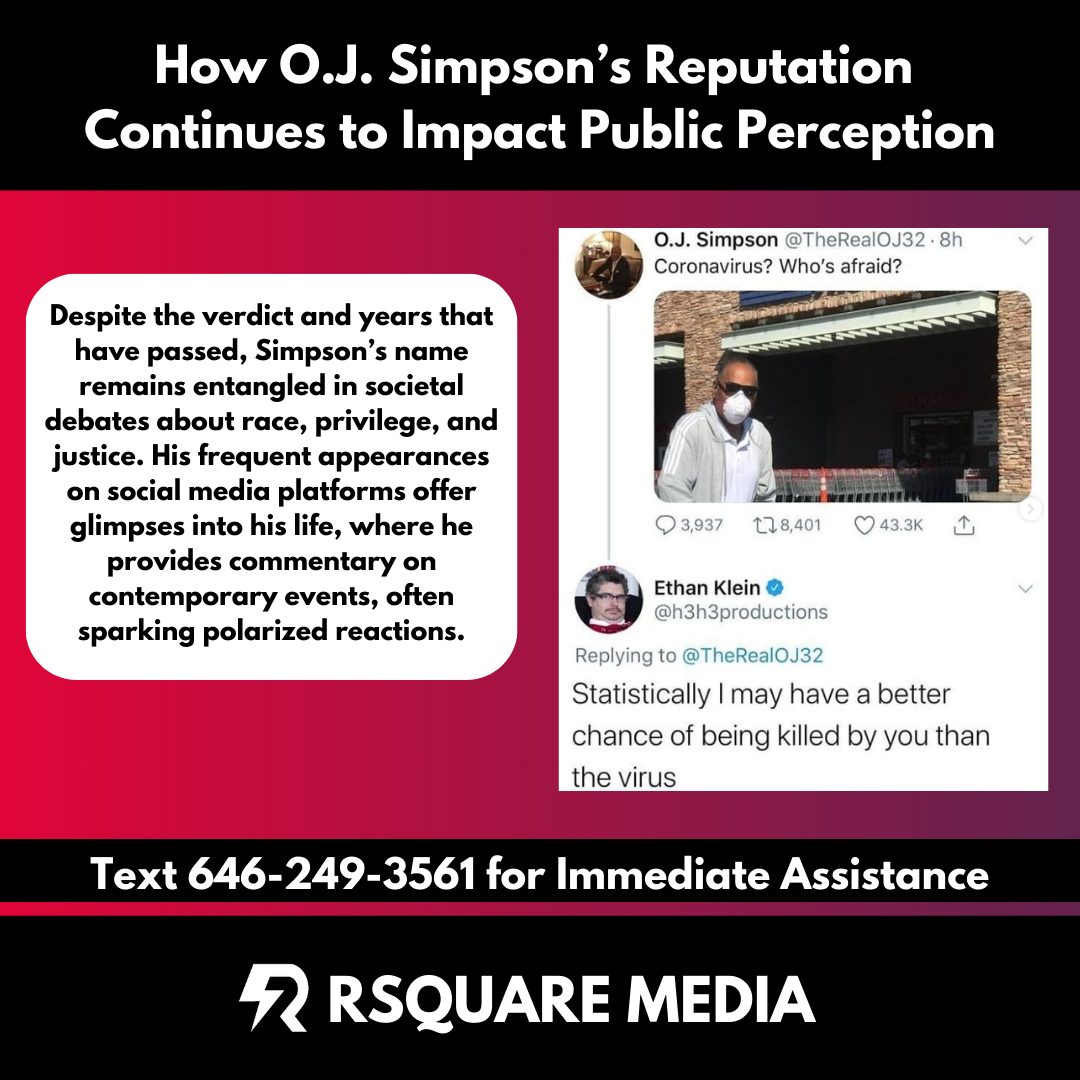O.J. Simpson is a figure whose life story has been as widely discussed as it is polarized. As a former football star, actor, and media personality, he achieved fame early on, but his high-profile legal battles in the 1990s and other controversies have cast a long shadow over his reputation. Today, Simpson’s image is complicated by public fascination, media portrayals, and an ever-evolving cultural discourse that questions morality and legal responsibility. The story of O.J. Simpson serves as an essential case study on why reputation matters profoundly—particularly in the realm of public opinion and the need for strategic reputation management.
 The Rise of O.J. Simpson
The Rise of O.J. Simpson
Orenthal James “O.J.” Simpson rose to prominence through his undeniable athletic prowess and charisma. As a former NFL star, Simpson achieved fame playing for the Buffalo Bills and the San Francisco 49ers, earning the nickname “The Juice.” His achievements include breaking records, winning the Heisman Trophy in 1968, and becoming the first NFL player to rush for over 2,000 yards in a single season.
After his retirement from football, Simpson transitioned into acting, starring in films like The Naked Gun series and becoming a regular face on television. His affable personality won him a loyal fanbase and many endorsement deals, cementing his place in American pop culture. However, the goodwill he amassed as an athlete and actor would soon collide with a dark chapter of criminal allegations and sensationalized media coverage that would leave an indelible mark on his reputation.
 The Trial of the Century: Shaping Public Perception
The Trial of the Century: Shaping Public Perception
The 1994 murder of Nicole Brown Simpson, O.J. Simpson’s ex-wife, and her friend, Ronald Goldman, launched a legal saga that dominated headlines globally. Simpson, the prime suspect, became the focus of one of the most televised and talked-about murder trials in history. Dubbed “The Trial of the Century,” it sparked a nationwide debate on race, justice, and celebrity privilege.
When the jury ultimately acquitted Simpson in 1995, the verdict generated a strong division in public opinion. While some viewed the outcome as a triumph over systemic bias, others saw it as a failure of the justice system. In 1997, however, a civil court found Simpson liable for wrongful death, awarding the Goldman and Brown families a hefty financial judgment. This case and the subsequent civil verdict cemented Simpson’s controversial public image—a mix of admiration, pity, and distrust that persists decades later.
The Media’s Role in Shaping O.J. Simpson’s Legacy
The media played a pivotal role in shaping and amplifying the public’s perception of Simpson. As a public figure, Simpson’s life became open to intense scrutiny. The infamous white Bronco chase, aired live on television, made Simpson’s case a spectacle, and soon he became the subject of countless talk shows, books, and documentaries. High-profile television shows like The People v. O.J. Simpson: American Crime Story, produced by Ryan Murphy, revisited the case in 2016 and reignited public interest, exposing younger generations to the events surrounding his trial.
This relentless media attention has a profound impact on Simpson’s reputation. With each new documentary or series, producers often frame the narrative with a specific angle or intention. While many of these productions aim to explore nuanced perspectives on the case, they often reinforce public skepticism and reshape Simpson’s legacy in ways that are challenging to control or reverse.
Why Reputation Matters and the Ongoing Battle for Narrative Control
In a digital world where information is disseminated instantly and reputations are shaped by online discourse, reputation matters now more than ever. For high-profile individuals like Simpson, maintaining control over one’s narrative becomes increasingly difficult as new forms of media emerge and stories are retold. Reputation management strategies, however, can help steer the narrative toward a balanced view and potentially mitigate negative public perception. In Simpson’s case, his attempts to shift public opinion have included interviews, books, and public statements, although these efforts have often been met with mixed reactions.
Reputation management remains essential, especially when the narrative surrounding an individual is as controversial as that of Simpson. By maintaining a public relations team focused on narrative building, high-profile individuals can regain some control over how their story is told and ensure their perspective is included in public discussions.
 How O.J. Simpson’s Reputation Continues to Impact Public Perception
How O.J. Simpson’s Reputation Continues to Impact Public Perception
Despite the verdict and years that have passed, Simpson’s name remains entangled in societal debates about race, privilege, and justice. His frequent appearances on social media platforms like Twitter offer glimpses into his life, where he provides commentary on contemporary events, often sparking polarized reactions. While some followers view him with nostalgia or curiosity, others remain skeptical, viewing his presence as a reminder of unresolved questions surrounding the case.
Simpson’s social media presence is a classic example of reputation matters, as it illustrates how continuous engagement can both humanize and polarize a public figure. For Simpson, the platform offers a way to stay relevant and share his perspective directly with the public, albeit under the gaze of intense scrutiny.
The Role of Strategic Reputation Repair and Management
Given the lasting impact of his trial and the continued media attention, O.J. Simpson’s legacy demonstrates the importance of reputation repair and strategic reputation management. Implementing reputation repair strategies can be beneficial for public figures facing ongoing scrutiny. Here are some strategies Simpson could have considered and other high-profile individuals can adopt:
- Media Training and Controlled Messaging: Working with reputation management professionals can help public figures maintain composure, present a consistent narrative, and avoid statements that may be taken out of context. For Simpson, early involvement of PR teams might have provided a more measured approach to addressing the controversies surrounding him.
- Transparency and Accountability: When faced with controversy, expressing transparency and accountability can demonstrate growth. Engaging in open dialogues, acknowledging mistakes, and actively participating in initiatives aligned with personal values can aid in rebuilding a tarnished reputation.
- Establishing New Public Narratives: Moving beyond past controversies is essential for figures like Simpson. Establishing a new legacy—whether through charity, advocacy, or positive contributions—can help reshape public opinion over time, allowing individuals to be seen through a different lens.
- Regular Monitoring of Online Reputation: Social media platforms can quickly turn against high-profile figures if not managed carefully. Regular monitoring and professional guidance can prevent controversies from escalating and damaging reputation further. For Simpson, proactive reputation management strategies could have provided more control over the narrative surrounding his name.
 The Role of Public Perception in Shaping High-Profile Legacies
The Role of Public Perception in Shaping High-Profile Legacies
Public perception is often fluid, impacted by media narratives, cultural values, and the actions of individuals. For high-profile figures like Simpson, understanding why reputation matters and implementing effective reputation management strategies can help shape how they are remembered. As seen in Simpson’s case, a mix of sensational media coverage and polarizing public opinions can drastically alter a public figure’s legacy. However, with the right approach to reputation management, it is possible to manage and even reshape public narratives.
 Conclusion: The Everlasting Impact of O.J. Simpson’s Story
Conclusion: The Everlasting Impact of O.J. Simpson’s Story
O.J. Simpson’s life serves as a reminder that reputation matters immensely, especially for those in the public eye. Despite attempts to control his narrative, Simpson’s story has been told, retold, and reframed by a society fascinated with crime and controversy. His case illustrates the lasting effects of public perception and media representation, underscoring the importance of reputation management for high-profile individuals.
For figures like Simpson, strategic reputation management offers a pathway to navigate complex legacies and potentially shift public perception over time. In today’s digital landscape, where narratives are continually shaped by media, reputation management serves as an invaluable tool to help control, repair, and manage one’s image.
CTA: Reputation matters more than ever in the modern digital age. If you’re dealing with reputation challenges or simply want to ensure your story is told accurately, connect with Rsquare Media, the leader in reputation management and PR solutions. Schedule a free consultation today at rsquaremedia.com or directly at calendly.com/rsquaremedia to start building or repairing your legacy.

